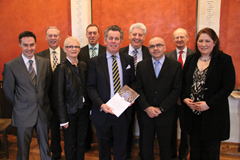Enterprise Committee renewables report
 Northern Ireland should make more use of all its energy resources not just wind, according to the Enterprise, Trade and Investment Committee.
Northern Ireland should make more use of all its energy resources not just wind, according to the Enterprise, Trade and Investment Committee.
Following an inquiry into barriers to the development of renewable energy, the enterprise committee called on the Executive to implement “clear and identifiable targets by which we can measure our progress.”
The committee said that policy must look “well beyond” 2020 in order to secure our long-term energy future. In addition: “any vision for our energy future must not only ensure an integrated approach within Northern Ireland, it must also be integrated with the visions of other devolved administrations, with the Republic of Ireland and possibly even further afield.”
The committee recommended that the Executive:
• gives all responsibility for energy policy to a single government department;
• implements interim targets for electricity consumption from renewable sources;
• includes targets for energy creation from sources other than wind in the SEF; and
• ensures that a public consultation on the North/South interconnector is a top priority.
In addition, DETI should learn from the success of other European regions in accessing funding and ensure that local business don’t miss out on those opportunities. Invest NI should grow internal renewable energy markets and the skills required to support it.
Too much investment and policy emphasis was placed on on-shore wind which was detrimental to other forms of energy generation, the committee heard. Respondents also stated that Northern Ireland’s “vibrant” manufacturing base could provide a sound foundation for the development of the renewable energy industry.
Base costs in Northern Ireland are higher than in competing regions, the respondents said. Norway and Denmark were cited as examples of low-cost regions exporting to the global market.
Northern Ireland’s energy sector is “monopolistic” because NIE dominates the market, according to the respondents, who added that greater competition is needed.
Invest NI’s policy of favouring exporting companies was criticised and witnesses said that, at current levels, the market could not fully absorb the skills available within the region. This would result in a brain drain. In addition, they pointed to examples of firms developing innovative technologies in Northern Ireland only to subsequently move “across the water to sell and to set up shop”.
Low public awareness about the need to develop renewable energy is a further impediment. Instead of educating the public on energy efficiency, the Executive should be explaining grid infrastructure, security of supply, economic competitiveness and the need to reduce carbon consumption, it was suggested.
Respondents supported a renewable heat incentive (RHI). On 14 March, Enterprise Minister Arlene Foster moved a legislative consent motion on the UK’s Energy Bill which would allow the Executive to introduce its own RHI. Because Northern Ireland’s energy market differs greatly from the rest of the UK. “It has been appropriate for separate consideration to be given to how the heat market here might be encouraged and incentivised, so that a Northern Ireland solution can be developed for the Northern Ireland market,” Foster told the Assembly.
Energy from waste should be driven at the top level of government instead of local councils, the committee was told. There was a consensus that the current renewable obligation certificate (ROC) system bred uncertainty and made banks reluctant to finance renewable projects. A feed-in tariff would be more desirable.
Planning delays were a major barrier and respondents told the committee that unless consents for the construction of power lines, electricity sub stations and other infrastructure projects were allowed, the 40 per cent target would not be met. Chairman Alban Maginness said: “There is so much potential from other technologies such as biomass and geothermal and we would like to see [DETI] considering these. We are falling behind Europe in the development of these technologies. We are also missing out on opportunities that would help grow Northern Ireland’s economy.”





